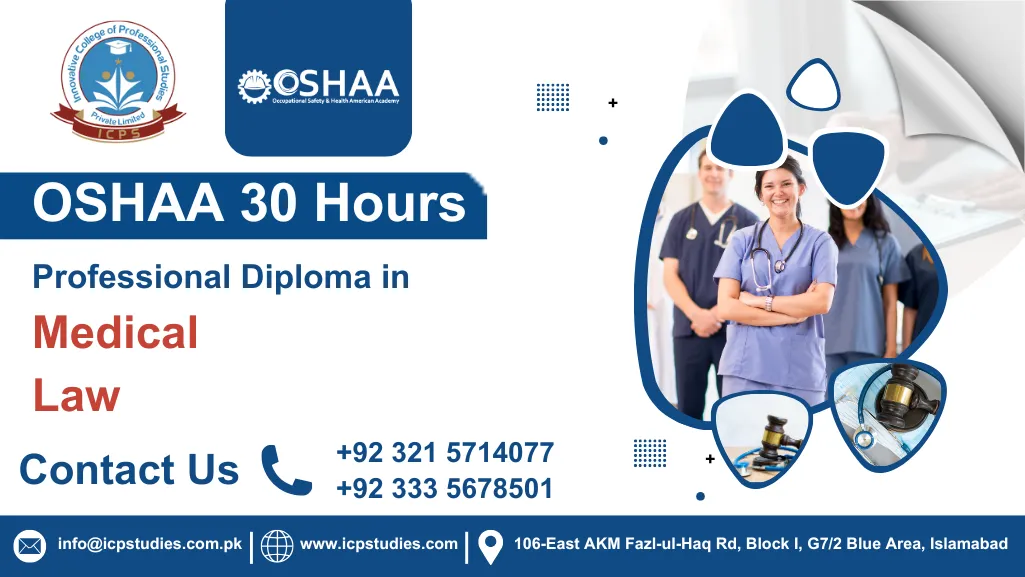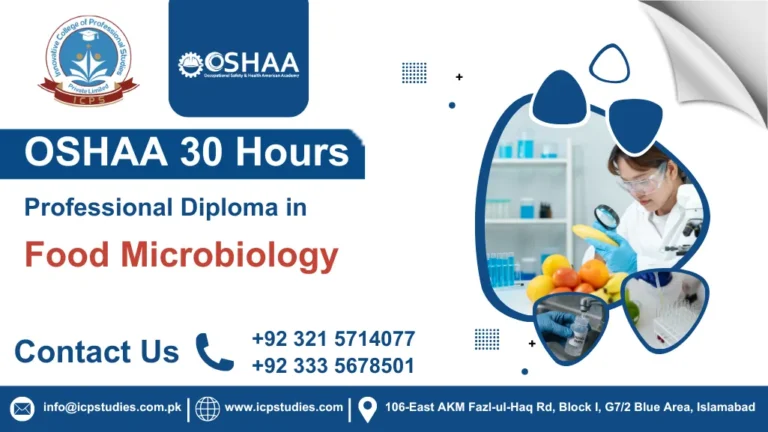The OSHAA 30-Hours Professional Diploma in Medical Law is a specialised qualification designed for professionals seeking comprehensive knowledge in the complex and evolving field of medical law. This diploma is ideal for legal practitioners, healthcare professionals, policy makers, and individuals involved in regulatory compliance, providing them with the necessary skills to navigate legal challenges in healthcare settings effectively.
This intensive 30-hour diploma course offers an in-depth exploration of medical law, focusing on the legal frameworks that govern medical practice, patient rights, healthcare ethics, and medico-legal responsibilities. The programme emphasises practical application alongside theoretical understanding, preparing participants to manage medico-legal issues confidently.
The OSHAA 30-Hours Professional Diploma in Medical Law is a critical qualification for those involved in the intersection of law and healthcare. With its rigorous curriculum and practical focus, it equips professionals to confidently address legal challenges and enhance patient safety and rights within the healthcare system. This diploma not only enriches knowledge but also opens pathways for career advancement in a vital and growing field.
All About OSHAA 30-Hours Professional Diploma in Medical Law
Course Overview
The OSHAA 30-Hours Professional Diploma in Medical Law provides a focused and comprehensive overview of the legal principles that underpin medical practice and healthcare delivery. This course is designed to equip professionals with the knowledge and skills necessary to navigate complex medico-legal issues, including patient rights, consent, negligence, and regulatory compliance. By integrating current legislation and case law, the diploma ensures participants stay informed of the latest developments in medical law.
Structured for busy professionals, the 30-hour programme balances theoretical frameworks with practical applications, allowing learners to apply legal concepts effectively within healthcare settings. The course is ideal for legal experts, healthcare practitioners, and administrators seeking to enhance their understanding of medical law to manage risks, uphold ethical standards, and improve patient safety. Upon completion, participants will be confident in handling medico-legal challenges with professionalism and legal precision.
Study Units
- Introduction to Medical Law and Ethics (3 hours)
- Consent, Capacity, and Patient Autonomy (4 hours)
- Confidentiality and Data Protection in Healthcare (3 hours)
- Medical Negligence and Duty of Care (4 hours)
- End-of-Life Decision-Making and Advance Directives (3 hours)
- Mental Health Law and Safeguarding (3 hours)
- Professional Regulation and Fitness to Practise (3 hours)
- Legal Aspects of Clinical Research and Innovation (4 hours)
- Legal Processes, Tribunals, and Healthcare Litigation (3 hours)
To enrol in the OSHAA 30-Hours Professional Diploma in Medical Law, applicants should meet the following entry requirements:
Minimum Age:
Candidates must be at least 18 years old to register for the course.
Educational Background:
Applicants are expected to have a minimum of a secondary school certificate or equivalent qualification. A background in law, healthcare, or related fields is advantageous but not mandatory.
Work Experience:
While prior work experience in healthcare, legal practice, or regulatory roles is preferred, it is not a strict requirement. The course is suitable for both early-career professionals and those seeking to specialise in medical law.
Language Proficiency:
Proficiency in English is essential, as all course materials and assessments are delivered in English. Candidates should have a good command of written and spoken English to fully engage with the content and complete assignments successfully.
Legal practitioners specialising or interested in medical and healthcare law
Healthcare professionals including doctors, nurses, and clinical managers seeking legal knowledge
Medical administrators and compliance officers responsible for regulatory adherence
Policy makers and regulators working within health services and public health sectors
Students and academics pursuing careers or research in medical law, ethics, and healthcare regulation
Risk managers and insurance professionals involved in medical negligence and liability cases
Professionals aiming to enhance their understanding of patient rights, consent, and medico-legal documentation
Learning Outcomes
Introduction to Medical Law and Ethics
- Understand fundamental principles of medical law and healthcare ethics
- Recognise the importance of ethical decision-making in medical practice
- Identify key legal concepts that affect healthcare delivery
Consent, Capacity, and Patient Autonomy
- Explain the legal requirements for valid consent in healthcare
- Assess patient capacity and understand its implications on treatment decisions
- Appreciate the role of patient autonomy in medical law
Confidentiality and Data Protection in Healthcare
- Understand legal obligations regarding patient confidentiality
- Apply data protection principles relevant to healthcare information
- Manage breaches of confidentiality and related legal consequences
Medical Negligence and Duty of Care
- Define medical negligence and duty of care in clinical settings
- Identify elements required to establish a negligence claim
- Evaluate risk management strategies to minimise liability
End-of-Life Decision-Making and Advance Directives
- Explain the legal frameworks governing end-of-life care
- Understand the use and validity of advance directives
- Analyse ethical and legal challenges in end-of-life decision-making
Mental Health Law and Safeguarding
- Understand key legislation related to mental health and patient rights
- Recognise safeguarding responsibilities for vulnerable patients
- Apply legal principles in the management of mental health cases
Professional Regulation and Fitness to Practise
- Identify regulatory bodies and their role in healthcare professions
- Understand standards of professional conduct and disciplinary procedures
- Assess factors affecting fitness to practise and remediation processes
Legal Aspects of Clinical Research and Innovation
- Understand legal requirements for clinical research and trials
- Analyse ethical considerations in medical innovation
- Apply regulations governing patient safety and informed consent in research
Legal Processes, Tribunals, and Healthcare Litigation
- Describe the legal processes involved in healthcare disputes
- Understand the role of tribunals and courts in medico-legal cases
- Develop strategies for effective litigation management and resolution
FAQs OSHAA 30-Hours Professional Diploma in Medical Law







